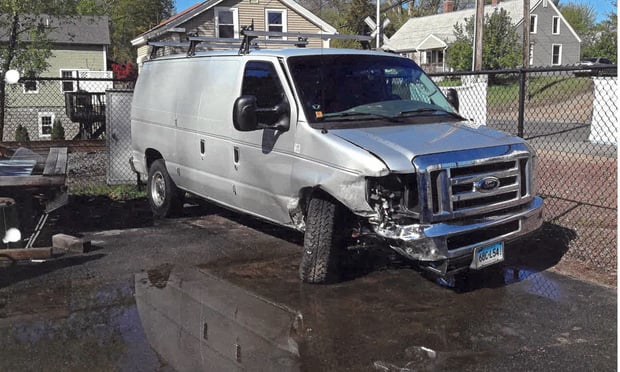AS U.S. domiciled companies increasingly do business abroad, more agents and brokers are discovering a need to expand their customary product offering beyond property and liability insurance to the oldest line of all: marine insurance. In particular, for clients who ship a significant volume of commodities or finished products abroad, producers may need to develop more than a passing acquaintance with ocean cargo insurance.
When it comes to marine insurance, I suppose I'm an old hand. I've been involved in the line since starting my career in 1982 and today am the director of the marine department at Dewitt Stern Imperatore. The department has a staff of 10 and recently opened an office in Piraeus, Greece, the site of a major shipping center. Indeed, one of the aspects of marine insurance that I like best is its international scope. Brokers are not limited to dealing with just domestic insurers.
Traveling internationally to meet these markets is enjoyable, too.
Ocean marine insurance makes up the majority of business at Dewitt Stern Imperatore. We write all lines of coverage, including hull & machinery for ocean-going vessels as well as for such risks as tugs, barges, ferries, dinner excursion vessels and offshore casino boats (which by law have to travel three miles offshore on the East coast or nine miles on the Florida west coast before patrons can sit down at the blackjack tables). We also write protection & indemnity, the main form of marine liability insurance; loss of hire insurance, the marine equivalent of business interruption; war-risk insurance; and anything else our clients need-including ocean cargo insurance.
Our typical client for ocean cargo is a shipper; i.e., an exporter of goods covering the gamut from soft coal, pig iron and petroleum to produce and household appliances. For the most part, we obtain open cargo policies for them, which cover all goods shipped during the year, with a maximum amount per shipment. All our clients ship a significant volume of goods. Indeed, I would say the cutoff point for a bona fide ocean cargo prospect is $10 million in annual shipping values. Below that, exporters are probably better off financially having their goods shipped by a freight forwarder, which can insure them under its own open cargo policy.
Prospecting and marketing
Our best source of new business probably consists of our current clients. It's quite common for us to get calls from marine prospects who were referred to us by satisfied customers. Such centers of influence as admiralty attorneys and marine insurance consultants also sometimes put prospects in touch with us. In addition to using such immediate sources of new business, we are involved in numerous marketing activities that help us get our name before prospects and lead to sales of ocean cargo and other forms of marine insurance.
Seminars: From time to time, we are involved in educational events that give us an opportunity to demonstrate expertise in marine insurance. For instance, last year we were asked by Intertanko, an international association of independent tanker owners, to host a one-day seminar in New York for its members. We arranged for various speakers to address such topics as the Terrorism Risk Insurance Act, political risk insurance and the state of the U.S. marine insurance market. The event was of great benefit to us. It gave us the opportunity to meet ship owners, risk managers of shipping companies and other prospects, and has led to new business.
Advertising: We advertise in various marine-oriented journals and magazines, including WorkBoat, which covers both the blue-water (ocean) and brown water (inland waterways) sides of the marine business and also publishes directories that can be useful for prospecting. [Italics on] Newsletters: [Italics off] From time to time, we send circulars to clients and prospects, informing them of developments in the marine business and providing updates on conditions in the insurance market.
Social functions There are numerous social events, particularly around Christmas, that marine insurance brokers are almost expected to attend, and of course we do. In addition to functions sponsored by marine insurance companies, there are dinners hosted by such organizations as the Maritime Law Association and the Association of Average Adjusters. Another popular event-perhaps the largest of the year-is the Silver Bell Award Dinner sponsored by the Seamen's Church Institute of New York, which performs a number of religious, educational and social services for seamen throughout the world. Everyone in the business, including shipping companies, attends this annual June event.
In addition to taking part in these various annual functions, several of us in the marine department are associate members of the Connecticut Maritime Association, one of 30 or so "mariners clubs" across the country to which marine surveyors and adjusters, admiralty attorneys and other marine-industry professionals belong. Our involvement in these various organizations and events is vital to our networking efforts in the world of marine insurance.
The Internet: We're in the process of creating a Web site. Meanwhile, interestingly enough, domestic shippers sometimes click on the Web sites of overseas marine brokers with which we have relationships. The brokers then forward the contacts to us.
Coverage
Open cargo policies are the main products used to insure shippers' goods. They cover all shipments made during the year, up to a certain limit per shipment, which for our clients generally ranges from $1 million to $5 million but sometimes is significantly higher. The policies generally provide "warehouse to warehouse" coverage, protecting the goods not only on transoceanic shipments by air or vessel but also while on rail or truck as they travel from shipper to consignee. For a short period of time, up to three or four weeks, goods also can be covered in warehouses. Coverage can be arranged for longer storage periods, subject to an additional insurance premium.
In this market, each insurer basically uses its own open cargo policy, although the forms and clauses promulgated by the American Institute of Marine Underwriters may provide some of the components. (For a list, visit www.aimu.org/formsmeuname. html.) The basic AIMU open cargo policy is "all risk," with exclusions covering such perils as inherent vice of the shipped goods, ordinary leakage, and the use of insufficient or unsuitable packing materials. Several warranties also have much the same effect as exclusions, barring coverage for loss of market (i.e., lost business) arising from delay in the transit of goods; war risks; strikes, civil commotion and vandalism; and radioactive contamination. Coverage for such exclusions and warranties sometimes can be "bought back" via endorsement.
Ocean cargo insurers differ considerably in the types of products they are willing to insure. Such commodities as metals, crude oil and soft coal are among the more difficult to cover. Certain produce, e.g., shipments of bananas from the tropics, also can be a challenge to insure. Thus, an important part of being an ocean marine broker is knowing who writes what.
When evaluating submissions, underwriters chiefly are interested in information about the assureds (as insureds are called in marine insurance). Who are these people, how long have they been in business, and what is their experience? The second most important factor is the loss experience over the past five years. The lack of a track record makes it extremely difficult to arrange coverage for someone new in the business. Manufacturers who are just starting to ship products abroad often can rely on their current insurer(s) to help them with their ocean cargo needs, but for new businesses without longstanding insurer relationships, the search for ocean cargo insurance is not an easy one.
The countries in which shippers and consignees are located also are of interest to underwriters. So is the manner of conveyance. If goods are shipped on a vessel (as opposed to aircraft), underwriters want to know its age and performance history. Most underwriters are uncomfortable insuring cargo on vessels that are more than 20 years old.
Once coverage is in place, our assureds submit monthly shipping volume reports to us, which we forward to the insurers. They advise of the proper premium, which we then bill the assureds. At the end of the 12-month coverage period, the policies are subject to a final audit and subsequent premium adjustment. The other major service responsibility is the timely issuance of certificates of insurance to our shippers' consignees.
For ocean cargo coverage, our main domestic markets are Chubb, CNA, Great American, ACE, AIMA, AXA, Navigators and Mutual Marine Office. Overseas, we primarily use the London market. Over the past two or three years, ocean cargo rates may have firmed up a bit, but they rarely have been volatile.
That's not the case with some of the other ocean-marine lines we sell. The hull & machinery line has just come out of a two- to three-year hard market in which rates increased substantially. Over the past five years, there also has been a significant contraction in this line. In the U.S. market, we now have only a half-dozen or so markets for the coverage.
In regard to protection and indemnity insurance, 95% of ocean-going vessels are insured by the International Group of P&I Clubs, a worldwide organization whose members are essentially mutual insurance companies. The American Club, which was founded in 1917 and is located in New York, is the only member in the Western hemisphere. We can access these clubs, much as we would any insurer, to obtain coverage for clients. Meanwhile, P&I for our clients who stay close to shore is usually available from the same insurers that provide the hull & machinery coverage.
I hope you have found this overview of our operations of interest. No doubt, some of the terms and organizations mentioned in this article will be unfamiliar to many agents and brokers. But that's likely to change as U.S. commerce increasingly becomes international.
Gary Ferrazzano is the director of the marine department at Dewitt Stern Imperatore, which he joined in 1999. Mr. Ferrazzano started his insurance career in 1982 with John P. Tilden Ltd., a small brokerage firm that later merged with Frankel & Co., where he was employed until joining Dewitt Stern Imperatore.
Want to continue reading?
Become a Free PropertyCasualty360 Digital Reader
Your access to unlimited PropertyCasualty360 content isn’t changing.
Once you are an ALM digital member, you’ll receive:
- Breaking insurance news and analysis, on-site and via our newsletters and custom alerts
- Weekly Insurance Speak podcast featuring exclusive interviews with industry leaders
- Educational webcasts, white papers, and ebooks from industry thought leaders
- Critical converage of the employee benefits and financial advisory markets on our other ALM sites, BenefitsPRO and ThinkAdvisor
Already have an account? Sign In Now
© 2024 ALM Global, LLC, All Rights Reserved. Request academic re-use from www.copyright.com. All other uses, submit a request to [email protected]. For more information visit Asset & Logo Licensing.








